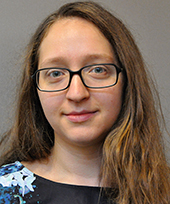Position
Professor of Education
Deputy Director of Research
Fellow of Hughes Hall
E-mail Address
isi22 [at] cam [dot] ac [dot] uk
Qualifications
PhD Education (University of Cambridge)
MPhil Education (University of Cambridge)
BA Integrated Social Science (Jacobs University Bremen)
Membership of Professional Bodies/Associations
Society for Research into Higher Education
British Association for International and Comparative Education
European Association for Research on Learning and Instruction
Profile
My research explores education inequality, looking at the socio-economic factors which shape children's and young people's access to, and outcomes from, education. I focus particularly on fair access and equitable participation in higher education and how earlier educational experiences affect this. I investigate these issues primarily in relation to the English education system, and also at a macro scale in low- and lower-middle income contexts.
My work builds evidence about what is effective in supporting fairer higher education access, widening participation to higher education, and better learning in schools, using large-scale experimental and quasi-experimental research designs. I have substantial experience leading large-scale research in education, exploring the effectiveness of established interventions to improve student learning and narrow socio-economic attainment gaps, using experimental and quasi-experimental designs.
In the Faculty of Education I am Deputy Director of Research.
Academic Area/Links
I lead FairLab, the research lab for fair access and success in higher education. Our work builds evidence to understand and tackle inequality in school outcomes and higher education access, participation, and success.
I am also a member of the THRiVE research group and of the REAL Centre in the Faculty of Education.
Research Topics
- Education access and learning inequalities
- Fair access, widening participation, and outcomes in higher education
- Evaluations of educational programmes and interventions
- Quantitative methods in education
Prospective doctoral applications
My doctoral supervision capacity for an October 2026 start will be limited to maximum two new doctoral researchers (full-time equivalent).
Please reach out to me by email if you are interested in pursuing a PhD with me from 2026. To this email you must attach a brief research proposal (maximum two pages) that includes your motivation to undertake a PhD. Guidance on how to assemble a research proposal may be found here.
Before you reach out by email, it is essential that (1) your proposed research directly addresses one of the topics listed above; and (2) your proposed research is quantitative in nature, using secondary data analysis, and/or applying (quasi-) experimental or longitudinal designs, econometric analysis, or similar.
If your research does not align with these directions, or your email does not include the reserach proposal, I regret that I am unable to supervise you starting 2026 and you may not receive a response to your email.
Teaching
Postgraduate teaching and supervision
- MPhil Educational Policy Leadership and Improvement (course co-leader)
- MPhil Education Globalisation and International Development
- MPhil Research Methods Strand
- Doctoral Pathways
- Cambridge Research Methods CaRM (advanced statistics modules)
Selected Publications
Rodriguez-Anaiz, P., Inoyue, K., Baker, S., Benson, C., Dodson, E., Gardiner, K., Gavaghan, D., Heathershaw, T., Ilie, S., Jonckheer, C., McFarlane, M., Murray, N., Pollini, N., Robson, J., Watkis, D. (2025). A Toolkit for Fair Doctoral Admissions For Ethnically and Racially Minoritised Applicants. Close the Gap.
Phyo, L. W., & Ilie, S. (2025). Toward 2030: Inequities in Higher Education Access in Southeast Asia. Social Sciences, 14(10), 592.
Inouye, K., Robson, J., Anaiz, P. R., Baker, S., & Ilie, S. (2025). Assessing the person or the project? How disciplinary ontological and epistemological assumptions shape doctoral admissions in elite UK institutions. Higher Education, 1-21.
Ilie, S. & Maragkou, K. (2024). University applications during a pandemic. Cambridge Working Papers in Economics.
Ilie, S., Forbes, K., Curran, S., & Vermunt, J. D. (2024). Higher education students’ conceptions of learning gain. Active Learning in Higher Education, 14697874241270461.
Ilie, S., Maragkou, K., Brown, A., & Kozman, E. (2022). No Budge for any Nudge: Information Provision and Higher Education Application Outcomes. Education Sciences, 12, 701. https://doi.org/10.3390/educsci12100701
Hofmann, Riikka, and Sonia Ilie. (2022). A Theory-Led Evaluation of a Scalable Intervention to Promote Evidence-Based, Research-Informed Practice in Schools to Address Attainment Gaps. Education Sciences 12.5 : 353.
Ilie, S., Rose, P., & Vignoles, A. (2021). Understanding higher education access: Inequalities and early learning in low and lower‐middle‐income countries. British Educational Research Journal 47(5): 1237-1258
Archer, R., Higton, J., Sibieta, L., Tahir, I., Trammell, L. T., Ilie, S., Vignoles, A., & Zhao, V. (2021). The road not taken: the drivers of course selection: The determinants and consequences of post-16 education choices. Sub-report for the Social Mobility Commission.
Dimova, S., Ilie, S., et al. (2020). The Nuffield Early Language Intervention: Evaluation Report. Education Endowment Foundation. Available here.
Ilie, S., Vermunt, J.,& Brown, A. (2020). The role of reasoning ability in university students’ cognitive and metacognitive development. In Esterhazy, R. & Braun E., & Kordts-Freundinger, R. (Eds.). Higher Education learning. Berlin: Waxmann.
Vermunt, J. D., Ilie, S., & Vignoles, A. (2018). Building the foundations for measuring learning gain in higher education: a conceptual framework and measurement instrument. Higher Education Pedagogies, 3(1), 266-301.
Rose P., & Ilie, S. (2018). Who benefits from public spending on higher education in South Asia and sub-Saharan Africa?. Compare: An International Journal of Comparative and International Education: 1-18. http://dx.doi.org/10.1080/03057925.2017.1347870
Ilie, S., Sutherland, A. & Vignoles, A. (2017) Revisiting Free School Meal eligibility as a proxy for pupil socio-economic deprivation. British Educational Research Journal.doi:10.1002/berj.3260
Ilie, S., & Rose, P. (2016). Is equal access to higher education in South Asia and sub-Saharan Africa achievable by 2030? Higher Education, 72: 435–455, doi: 10.1007/s10734-016-0039-3.

